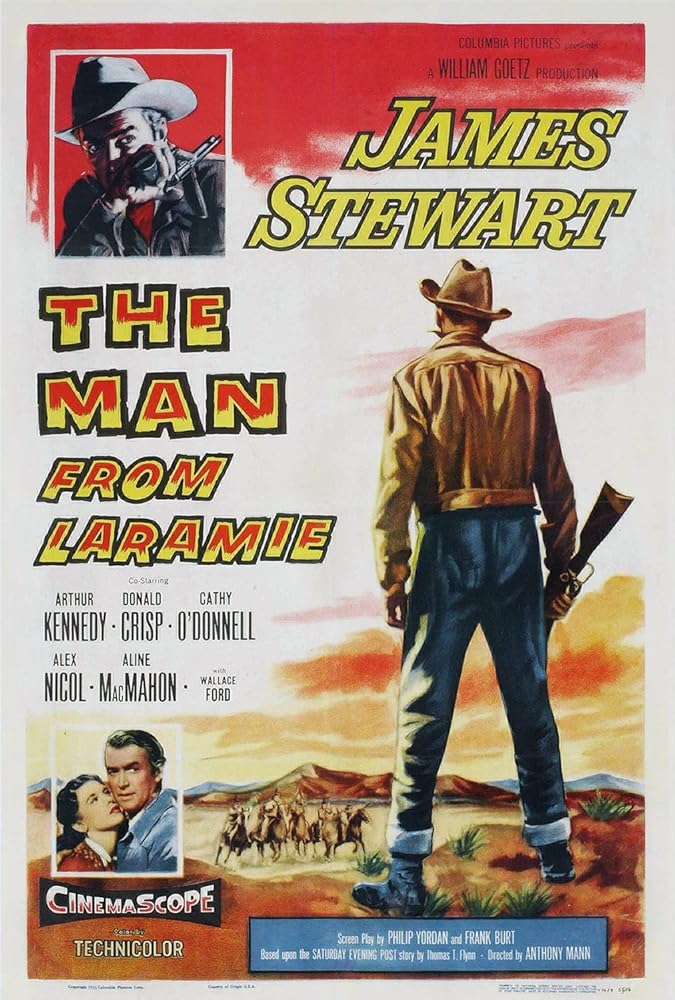
MAN FROM LARAMIE, THE
(director: Anthony Mann; screenwriters: story by Thomas T. Flynn/Philip Yordan/Frank Burt; cinematographer: Charles B. Lang; editor: William Lyon; music: George Duning; cast: James Stewart (Will Lockhart), Arthur Kennedy (Vic Hansbro), Donald Crisp (Alec Waggoman), Cathy O’Donnell (Barbara Waggoman), Alex Nicol (Dave Waggoman), Aline MacMahon (Kate Cannaday), Wallace Ford (Charles O’Leary), Jack Elam (Chris Boldt), James Millican (Tom Quigby); Runtime: 104; MPAA Rating: NR; producer: William Goetz; Columbia Pictures; 1955)
“A revenge Western Shakespeare might have liked.”
Reviewed by Dennis Schwartz
Anthony Mann (“Winchester ’73”) teams again with his favorite actor Jimmy Stewart (they worked together eight times throughout their careers and this was their last Western together). Mann brilliantly directs this ambitious psychological Western framed around a story similar to Shakespeare’s King Lear (the cattle baron patriarch Donald Crisp is going blind like Gloucester and is obsessed with who will inherit his kingdom). Frank Burt pens it from a story by Thomas T. Flynn and Philip Yordan. It was one of the first Westerns to be shot in CinemaScope. Charles B. Lang masterfully uses the wide-screen technology to give the film its haunting power. It was shot on location in New Mexico.
Will Lockhart (James Stewart) is not much of a talker as he crosses on wagon hostile Apache territory with his old-timer helper Charles O’Leary (Wallace Ford). He’s only willing to confirm that he’s coming from Laramie. They are carrying three wagons full of supplies to Coronado storekeeper Barbara Waggoman (Cathy O’Donnell), a single woman who took over the store when her father died. Lockhart hides that he’s a cavalry captain, who is on his own personal secret mission to find who sold the Apaches repeating rifles that were used to massacre a 12-man cavalry detachment at Dutch Creek. He is obsessed with getting revenge because one of those men killed was his younger brother.
Lockhart soon has a scrap with Dave Waggoman (Alex Nicol), who burns his three wagons and kills his 20 mules when he’s accused of trespassing on his father’s Barb ranch property to gather salt in a lagoon. Lockhart gathered the salt so he can profit from his return journey. Dave refuses to listen when told that he was informed by Dave’s cousin Barbara Waggoman that the salt was free and if it’s not he’s willing to pay for it. When these efforts at a peaceful settlement fail, Dave has one of his cowhands (who seem to easily turn at a moment’s notice from honest workers to thugs) rope and drag Lockhart by horse over a campfire. Psychopathic Dave is stopped from doing further harm by ranch foreman Vic Hansbro (Arthur Kennedy), who is an orphan raised by the wealthiest and most ruthless cattle baron in the territory Alec Waggoman (Donald Crisp). Alec bought the land from the Apaches and has continued a peaceful relationship with them, as they raid other white settlers but not his spread. Vic is loyal to father-figure Alec, who even though he’s not the natural son was promised by the patriarch a share of the ranch if he watched over the unstable Dave–someone Alec loves more than anyone else in the world, but realizes his son has some serious psychological issues and is not ready to take over the ranch.
After the salt incident Lockhart becomes deeply involved with the Waggomans despite everyone from the sheriff to all the Waggomans wanting him to leave town. Again, while working out of necessity for rancher Kate Cannaday (she’s the spurned lover of Alec who both hates and still loves him), Lockhart comes up against the sadistic Dave when her stray horses are rounded up by him on the Barb spread. Dave tries to ambush him and gets his hand shot. When the Barb cowhands arrive, they jump Lockhart and Dave maniacally shoots his rival’s shooting hand from point-blank range. While further embroiled with the evil Waggoman empire, built on greed and murder, Lockhart has to fight Alec over another misunderstanding involving his natural son. It leads to a violent conclusion concerning a festering family feud, the unhealthy growing ambitions of the rival sons and the identity of the gunrunners. All the attention is focused on how sicko are all the male Waggomans while Lockhart’s dark side (his hatred of Indians and obsession for vengeance) is ignored as just going the extra yard to get primitive justice in the brutal frontier.
It’s all magnificently accomplished. A revenge Western Shakespeare might have liked.
REVIEWED ON 7/1/2005 GRADE: B+